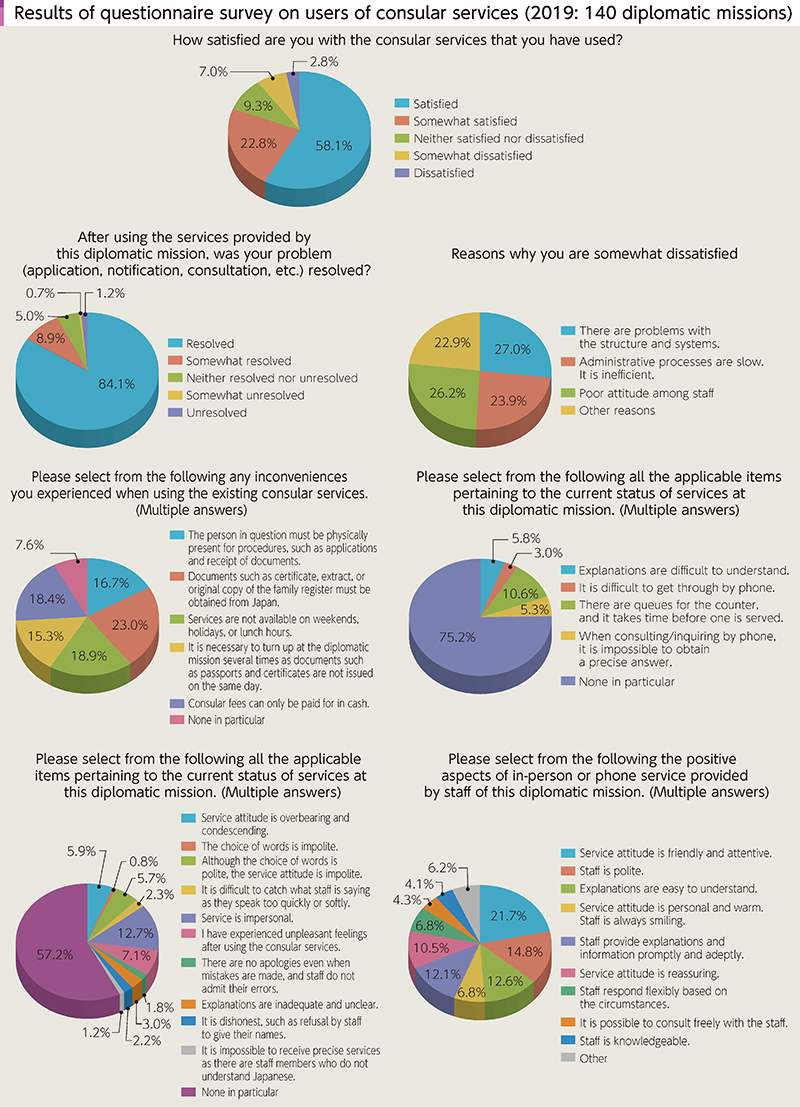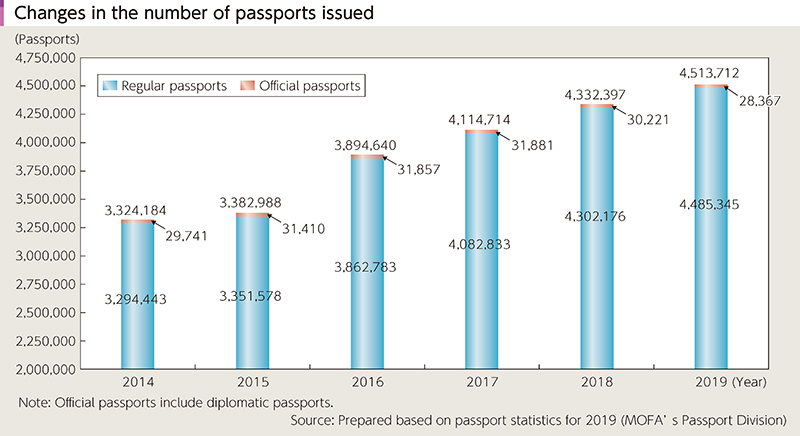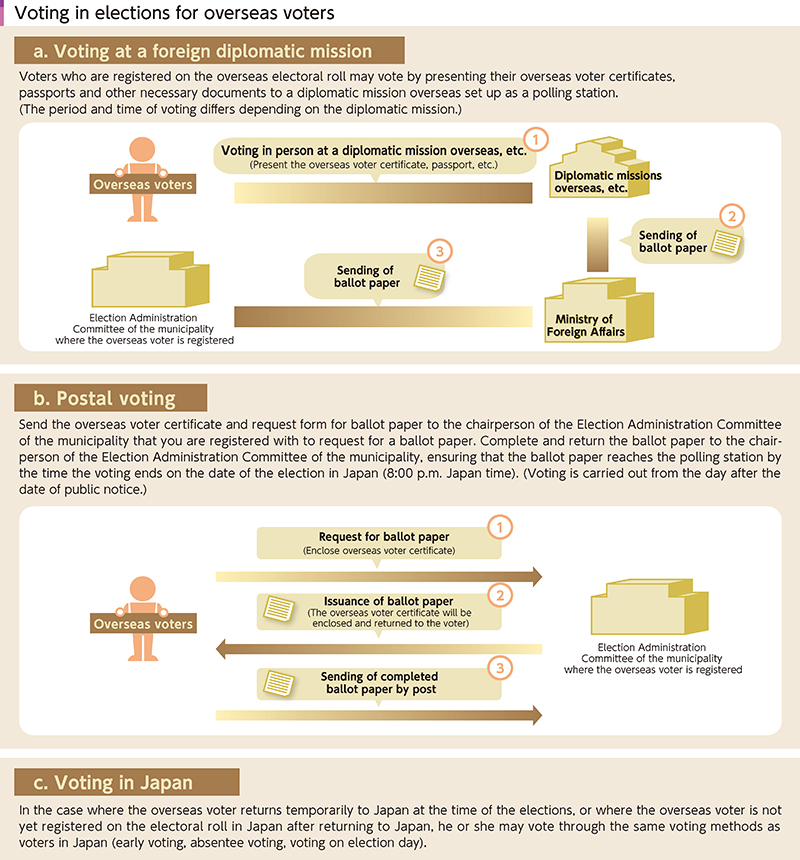Diplomatic Bluebook 2020
Chapter 4
Japan's Diplomacy Open to the Public
2 Consular Service and Assistance for Japanese Living Overseas
(1) Improving Consular Service
With the aim of providing quality consular services to Japanese nationals overseas, MOFA conducts a questionnaire survey every year on services such as consular staffs' attitudes in over-the-counter and telephone responses as well as work implementation status at diplomatic missions overseas. While the survey conducted in February 2020, on 140 diplomatic missions overseas and which received 39,579 effective responses, concluded that the overall level of consular services provided by the diplomatic missions overseas was almost satisfactory, opinions calling for improvement on the manners and service attitude of consular staff were also raised. MOFA takes users' feedback seriously, and will continue its efforts to enhance services and make improvements so as to provide high quality consular services in line with users' perspective.

(2) Issuance of Passports and Prevention of Illicit Acquisition of Passports
Approximately 4.49 million ordinary passports were issued in 2019. As of the end of December 2019, approximately 30.23 million ordinary passports were valid, and all of these were ePassports.3

The issuance of ePassports is effective for deterring the illicit use of passports such as forged or altered passports. However, there continue to be cases of illicit acquisition of passports by means of impersonation.4 There are still some cases where Japanese nationals or illegal foreign residents leave and enter Japan using passports acquired illegally under the name of another person. There are also reports of passports being used for borrowing money from financial institutions, opening bank accounts for the purpose of selling them to those who plot to commit other crimes, and subscribing to mobile phone services out of the passport holder's control. In order to prevent illicit acquisition of passports that may nurture these secondary or tertiary crimes, MOFA has been requesting prefectural governments to enhance strict identity examination when issuing passports at their passport centers, for example, by such means as designating a period of tightened inspections against the illicit acquisition of passports through identity theft at passport offices located in each prefecture. Furthermore, restrictions are placed on the issuance of passports to persons who are undergoing criminal prosecution, persons who have a suspended sentence, and persons who have violated the Passport Act, etc. Upon a report from the relevant institutions, the Minister for Foreign Affairs orders the surrender of passports to persons against whom an arrest warrant has been issued.
While the integrated circuit (IC) chips in Japanese passports record facial images and other information identifying the passport holders, ePassports with improved security against counterfeiting through the use of biometric information such as fingerprints have become widespread in other countries, and possibilities for more effective use of IC functions are also under consideration at the International Civil Aviation Organization (ICAO) and the International Organization for Standardization (ISO). In addition, starting October 1, 2018, the ‘downloadable applications' launched on January 4, 2016 at diplomatic missions overseas have now been adopted in Japan as well, improving convenience for applicants.
Reconsignment of passport-related works such as accepting and delivering passport, from the prefectural governments to municipal governments, has been permitted since 2006. As of December 2019, 897 cities and towns had launched passport services, which make up more than 50% of all the cities and towns in Japan.
- 3 An ePassport is a passport embedded with an integrated circuit (IC) chip which contains a digitized facial image (biometric information) of the passport holder to prevent forgery of passport and its illicit use by a third party. It was first issued in 2006.
- 4 The number of illegal acquisitions of passports discovered: 31 in 2015, 22 in 2016, 21 in 2017, 35 in 2018, and 42 in 2019.
(3) Overseas Voting
The overseas voting system allows Japanese voters living overseas to vote in national elections. In order to vote through the overseas voting system, it is necessary to be registered in advance on the overseas voter directory managed by the election board of the city or town government and to obtain overseas voter identification. Starting in June 2018, in addition to the conventional method of applying through a diplomatic mission overseas after moving there, Japanese nationals can now apply at their municipality service counter at the same time as filing their notice of moving overseas. As a result, there is no longer a need to appear in person at a diplomatic mission overseas after moving outside Japan, which simplifies procedures. Voters can vote by choosing one of the three methods of voting, a) voting at diplomatic missions overseas, b) voting by mail, or c) voting in Japan.
The diplomatic missions overseas have been making efforts to spread the overseas voting system and to increase the number of registered voters by publicizing the overseas voting system to the territories under their jurisdiction and carrying out a visiting service for the registration of Japanese nationals living in remote areas. Also, whenever an election is held, diplomatic missions overseas are responsible for voting administration, including PR prior to elections.

(4) Assistance for Japanese Nationals Living and Engaging in Activities Overseas
A Japanese Schools and Supplementary Education Schools
Education for children is one of the major concerns for Japanese nationals living abroad. In cooperation with the Ministry of Education, Culture, Sports, Science and Technology, MOFA provides assistance to the Japanese Schools (partial assistance for school building rental fees, remuneration for locally hired teachers, and safety measures expenses) so that the overseas school children at the age of compulsory education in Japan can receive a level of education equivalent to that in Japan. MOFA also provides the same assistance for Japanese Schools to Supplementary Education Schools (educational institutions established to maintain children's academic ability, such as Japanese language proficiency) mainly in areas where Japanese Schools are not located. In particular, MOFA is further strengthening and expanding assistance related to safety measures in light of the recent changes in the international terrorism situation. MOFA will continue providing these forms of support in the future.
B Medical/Health Measures
MOFA gathers information on infectious diseases being spread overseas and provides this information to a broad audience through the overseas safety website, websites of diplomatic missions overseas, emails, and other means. Furthermore, in order to provide health advice through consultations to Japanese nationals residing in countries where the medical situation is poor, MOFA dispatches medical teams with the cooperation of domestic medical institutions (to one country, seven cities in FY2019). MOFA also dispatches medical specialists to regions where infectious diseases or air pollution are becoming serious issues, and organizes health and safety lectures (seven countries, eight cities in FY2019).
C Responses to Other Needs
In order to eliminate the complexity of various procedures for Japanese nationals living overseas (such as converting Japanese driving licenses, obtaining residence/work permits) and to make living abroad more comfortable, MOFA continues to engage with the authorities in such countries where Japanese nationals reside.
For example, when converting driving licenses issued in foreign countries to Japanese driving licenses, all persons with driving licenses issued in a foreign country are exempted from taking certain sections of the Japanese driving test (theory/practical), when it has been confirmed that they have no problems with operating vehicles. On the other hand, as it is mandatory for Japanese nationals to take driving tests when converting Japanese licenses to local licenses in some countries and states, MOFA is calling for those countries to simplify the procedures for license conversion to the same degree as in Japan.
MOFA also supports victims of atomic bomb attacks living overseas in applying for the authorization of Atomic Bomb Diseases and for the issuance of Health Check Certificates, via diplomatic and consular missions.
